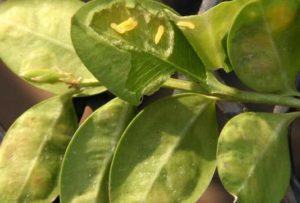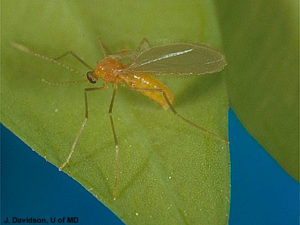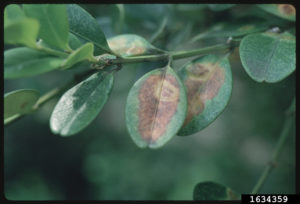
Boxwood Leafminer, Monarthropalpusi flavus (Schank), is a small mosquito looking insect about 1/8th of an inch long that causes serious damage to boxwoods. Despite the size, adult leafminers are easy to spot because of their bright orange color.
Like a lot of other spring pests, boxwood leafminers are an invasive species native to Europe. They were brought to the United States in the mid-1600s when boxwoods themselves were introduced. Known as “Man’s Oldest Garden Ornamental” and for being a low maintenance shrub, many homeowners have boxwoods on their property and are at risk for leafminers.

Keep An Eye Out:
Currently, leafminers are in their larvae stage. This is the stage where they do damage to your boxwoods. Before the adult flies dies, they lay their eggs in the leaf tissue. When they hatch, the maggots feed on the inside of the leaf causing the telltale symptoms listed below. Once it’s warm enough they emerge from the leaf as adults and repeat the cycle. This means if you see leafminers on your boxwoods this year, they will show up next year and the year after that, damaging your boxwoods more and more until dealt with.
Boxwoods infected with this leafminer will experience numerous symptoms and develop an unsightly appearance including;

Boxwood Leafminer Symptoms:
- Blisters on lower leaf surface
- Smaller leaves
- Off color leaves
- Early leaf drop
- Sparse Foliage When Heavily Infested
- Poor Color When Heavily Infested
How To Tell If You Have Leafminers:
Besides keeping an eye out for the symptoms above, you can check to see if there are leafminer larvae in your boxwood’s leaves. Pull off a leaf from your boxwood then bend the leaf in half until it snaps open. Look inside the leaf, if your boxwoods are infected you should be able to see tiny leafminer larvae.
Species Susceptible to This Insect:
All boxwoods are susceptible to this insect; however, American varieties tend to be more susceptible than the slower growing English variety.
If you’re thinking of planting boxwoods opt for the English varieties such as Buxus sempervirens Pendula, Suffruticosa, Handworthiensis, Pyramidalis, Argenteo-varigata and Varder Valley, which are more resistant to leafminers.
Think You Have Boxwood Leafminers?
Or Call 703-573-3029
Treatment:
Early spring is the best time of year to treat your boxwoods for leafminers. There are numerous different treatments available for Boxwood Leafminers. These treatments vary based on the pest’s point in the life cycle. Treatments are also based on the specifics of your landscape. For example, a boxwood planted near a vegetable garden will require a different treatment than a boxwood that isn’t near anything else on the property.
A Certified Arborist that follows Integrated Pest Management (IPM) Protocol will be able to diagnose and prescribe the right treatment at the right time for your property to get rid of boxwood leafminers.
